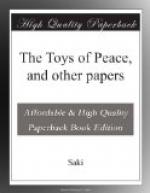A Poet praised the Evening Star,
Another praised
the Parrot’s hue:
A Merchant praised his merchandise,
And he, at least,
praised what he knew.”
It was this verse which gave the critics and commentators some clue as to the probable date of the composition; the parrot, they reminded the public, was in high vogue as a type of elegance in the days of Hafiz of Shiraz; in the quatrains of Omar it makes no appearance.
The next verse, it was pointed out, would apply to the political conditions of the present day as strikingly as to the region and era for which it was written—
“A Sultan dreamed day-long
of Peace,
The while his
Rivals’ armies grew:
They changed his Day-dreams into
sleep
—The
Peace, methinks, he never knew.”
Woman appeared little, and wine not at all in the verse of the hunter-poet, but there was at least one contribution to the love-philosophy of the East—
“O Moon-faced Charmer, and
Star-drowned Eyes,
And cheeks of
soft delight, exhaling musk,
They tell me that thy charm will
fade; ah well,
The Rose itself
grows hue-less in the Dusk.”
Finally, there was a recognition of the Inevitable, a chill breath blowing across the poet’s comfortable estimate of life—
“There is a sadness in each
Dawn,
A sadness that
you cannot rede:
The joyous Day brings in its train
The Feast, the
Loved One, and the Steed.
Ah, there shall come a Dawn at last
That brings no
life-stir to your ken,
A long, cold Dawn without a Day,
And ye shall rede
its sadness then.”
The verses of Ghurab came on the public at a moment when a comfortable, slightly quizzical philosophy was certain to be welcome, and their reception was enthusiastic. Elderly colonels, who had outlived the love of truth, wrote to the papers to say that they had been familiar with the works of Ghurab in Afghanistan, and Aden, and other suitable localities a quarter of a century ago. A Ghurab-of-Karmanshah Club sprang into existence, the members of which alluded to each other as Brother Ghurabians on the slightest provocation. And to the flood of inquiries, criticisms, and requests for information, which naturally poured in on the discoverer, or rather the discloser, of this long-hidden poet, the Rev. Wilfrid made one effectual reply: Military considerations forbade any disclosures which might throw unnecessary light on his nephew’s movements.
After the war the Rector’s position will be one of unthinkable embarrassment, but for the moment, at any rate, he has driven The Forbidden Horsepond out of the field.



